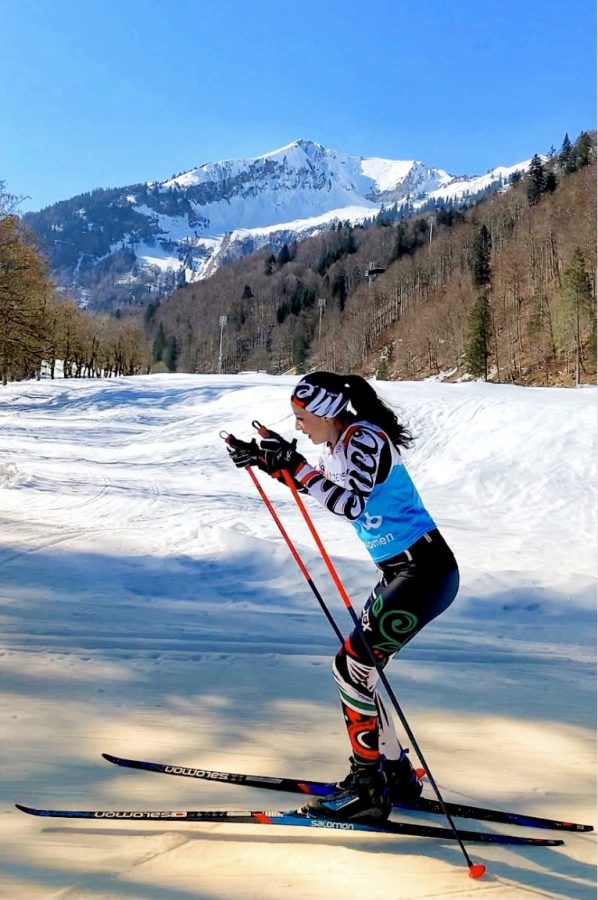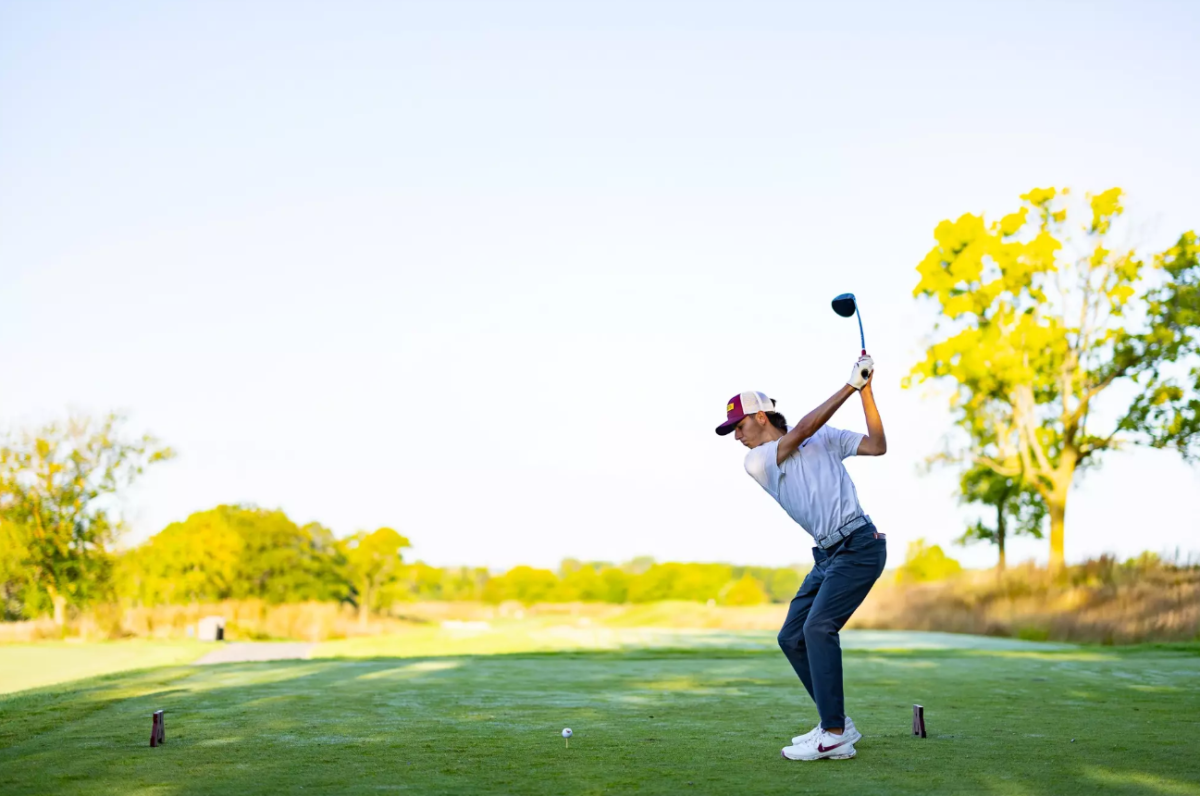University of Minnesota medical student Regina Martínez hates the cold, or at least she used to.
Martínez, from Mexico City, Mexico, dreaded even walking outside when she first experienced a colder climate in New York, where she earned her master’s degree in public health. But when she arrived in Minnesota for Medical School, she saw Minnesotans braving the cold, continuing their daily lives and even finding pleasure in winter activities.
After two years of observing Minnesotans running, biking and pursuing other pastimes in subzero temperatures, Martínez gave cross-country skiing a try. It wasn’t long before she was hooked and committed to the sport. She bought gear, started skiing competitively, and in February, Martínez became the first Mexican woman to compete in the FIS World Ski Championships.
“We ordered our team uniforms five months ago,” Martínez said. “I have been dying for almost a year to wear that uniform and represent my country … It was amazing.”
An unexpected mentor
Martínez has seen a lot. She’s lived in Mexico, Tennessee and Florida; she went to high school in Costa Rica and completed her bachelor’s degree in Texas. But it wasn’t until she came to Minnesota that she was introduced to cross-country skiing.
Martínez tried cross-country skiing a couple of times with friends and enjoyed it, but still wasn’t fully on board with the frigid temperatures in Minnesota. The polar vortex in 2019 was a source of frustration.
“Why am I here in Minnesota?” Martínez asked herself. “This is not meant for my Mexican genes.”
Frustrated, freezing and surrounded by feet of snow, Martínez decided to Google how many Mexicans had competed in the Winter Olympics, simply out of curiosity. The results showed that four athletes from Mexico represented their country in the 2018 winter games. And of those four, one athlete, Germán Madrazo, competed in cross-country skiing — the same pastime Martínez had grown to enjoy. But swimming in the responsibilities of a Medical School student, she had no free time to look into it further.
But Martínez couldn’t stop thinking about it. Her curiosity gave in and she reached out to Madrazo, just to see what the process entailed. A week later, Madrazo flew to Minneapolis to train her for only the cost of his plane ticket.
“I didn’t expect him to say, ‘You should do it. I believe in you. I’ll come train you like next week if you want,’” Martínez said. “It was, I think, largely his positive attitude and his encouragement that kind of threw me into the process.”
Madrazo had a similarly unorthodox introduction to skiing. He had completed 18 Iron Man competitions, but one of his friends still wasn’t impressed. Madrazo’s friend dared him to try something new, so he sent him an article about cross-country skiing. After reading the article, Madrazo said he was going to the Olympic games — and he did, just a year after he started training.
Madrazo was familiar with the grueling nature of cross-country skiing that made the process difficult, but Martínez faced an additional barrier. When she was in New York, she tripped walking down an icy sidewalk and fell flat on her face. It wasn’t a moment Martínez thought would change her, but that simple moment instilled in her an immense fear of falling, a fear that hadn’t gone away when she reached out to Madrazo.
When Madrazo arrived in Minneapolis, the two quickly took to the ski trails. They came to the top of a hill when Martínez stopped them. She confided in Madrazo her fear of falling and told him she’d understand if he no longer wanted to coach her.
“I told her, ‘I’m not going to let this fear stand in the way of your dream, and you’re not going to do it either,’” Madrazo said.
Martínez said that without Madrazo’s help, she probably wouldn’t have continued with the sport. But they went down the hill together, and Martínez started to overcome her fear. Madrazo said most of the time, athletes he’s working with will want to call it and go home after an hour of skiing. When he was in Minneapolis training Martínez, they spent upwards of three hours on the trails.
“We turned her into a little polar bear,” Madrazo said.
Madrazo saw her potential right away, and Martínez saw it shortly after when she competed in a ski event a month later.
Prior to competing in that event, Martínez had been primarily training for skate skiing. Skate skiing is a similar motion to ice skating or rollerblading, while classic skiing is what you’d typically think of going down a trail in more of a walking motion with maintained tracks. The Olympics rotates between the two styles every four years.
Just a month after training, Martínez competed in a classic ski race. In order to qualify for the Olympics, you need an average score of 300 points or lower. After the race, Martínez expected a score of around 1,000 points. When she notched a score of 490, she realized her Olympic pursuits weren’t that far out of reach.
‘You’re going to be making history’
Martínez’s skiing quickly improved, and she qualified for the 2021 FIS World Ski Championships in Oberstdorf, Germany. She was poised to become the first Mexican woman to compete in the event, but soon came another hurdle.
Just two weeks before she was set to fly to Germany, Martínez was dealing with a medical issue that caused unbearable pain. She couldn’t even walk to the kitchen to cook herself food. Martínez’s dad flew in from Mexico to help take care of her, and she said she wasn’t sure if she was even going to be able to make it to Germany.
Martínez made it to Germany, but the medical issue had prevented her from training leading up to the event. In the two weeks before she left, she was only able to ski three times. But when she crossed the finish line in Germany, a huge smile came across her face.
“I enjoyed every second of my race,” she said.
But it wasn’t because she qualified for the Winter Olympics. Martínez had her worst race in terms of timing in Germany, and she didn’t meet the 300 point threshold at that event required to qualify for the Olympics.
While she didn’t qualify for the Olympics, Martínez scored other achievements: She overcame overwhelming adversity while meeting a community of like-minded athletes who grew up in warmer climates, and she made history as the first Mexican woman to cross the finish line at the World Ski Championships. But Martínez’s pursuits haven’t stopped there.
On March 8, Martínez flew to Lebanon to continue competing in hopes of bringing her overall score down. If the qualification standard changes for 2022, she is going to be ready for Beijing.
“I’ve always believed that God makes things happen when you’ve already made them happen,” Madrazo said. “If she had not gone [to Lebanon] the rules probably would have never changed. But because she’s there, I’m pretty sure that with her will, she’s driving that change. Some might call it wishful thinking, but I call it purposeful thinking.”
When she came back from Germany, Martínez said she had even more drive, energy and desire to compete. She made history in Germany but wasn’t ready for her journey to end. In Lebanon, she earned three silver medals, one in a five-kilometer skate ski distance race and two in 1.2-kilometer skate skiing races, becoming the first Mexican — man or woman — to place in the top-3 in an official FIS event.
“I told that to Regina, I said, ‘Look, I want you to understand that it doesn’t matter how far you get,’” Madrazo said. “Every single strike, every single ski stroke, you’re going to be making history.”








